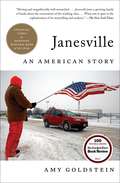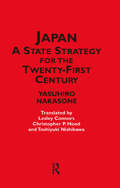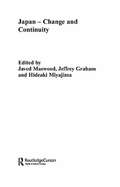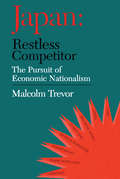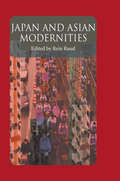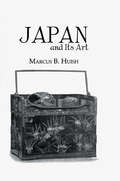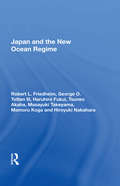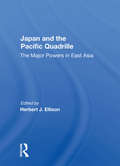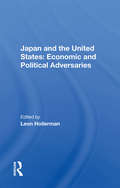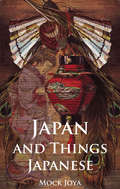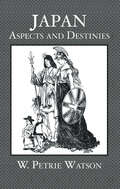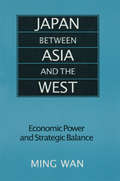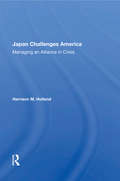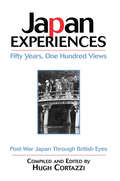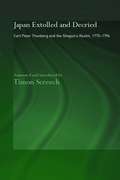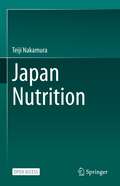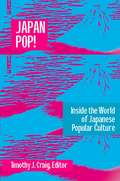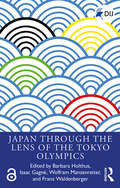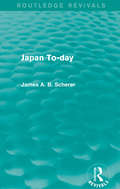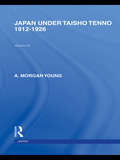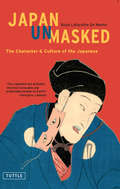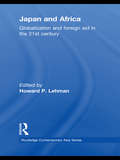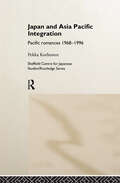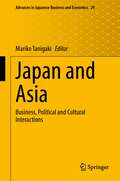- Table View
- List View
Janesville: An American Story (A Business Award-Winner)
by Amy Goldstein* Financial Times and McKinsey Business Book of the Year * Winner of the J. Anthony Lukas Book Prize * 800-CEO-READ Business Book of the Year * A New York Times Notable Book * A Washington Post Notable Book * An NPR Best Book of 2017 * A Wall Street Journal Best Book of 2017 * An Economist Best Book of 2017 * A Business Insider Best Book of 2017 * &“A gripping story of psychological defeat and resilience&” (Bob Woodward, The Washington Post)—an intimate account of the fallout from the closing of a General Motors assembly plant in Janesville, Wisconsin, and a larger story of the hollowing of the American middle class.This is the story of what happens to an industrial town in the American heartland when its main factory shuts down—but it&’s not the familiar tale. Most observers record the immediate shock of vanished jobs, but few stay around long enough to notice what happens next when a community with a can-do spirit tries to pick itself up. Pulitzer Prize–winning reporter Amy Goldstein spent years immersed in Janesville, Wisconsin, where the nation&’s oldest operating General Motors assembly plant shut down in the midst of the Great Recession. Now, with intelligence, sympathy, and insight into what connects and divides people in an era of economic upheaval, Goldstein shows the consequences of one of America&’s biggest political issues. Her reporting takes the reader deep into the lives of autoworkers, educators, bankers, politicians, and job re-trainers to show why it&’s so hard in the twenty-first century to recreate a healthy, prosperous working class. &“Moving and magnificently well-researched...Janesville joins a growing family of books about the evisceration of the working class in the United States. What sets it apart is the sophistication of its storytelling and analysis&” (Jennifer Senior, The New York Times). &“Anyone tempted to generalize about the American working class ought to meet the people in Janesville. The reporting behind this book is extraordinary and the story—a stark, heartbreaking reminder that political ideologies have real consequences—is told with rare sympathy and insight&” (Tracy Kidder, Pulitzer Prize–winning author of The Soul of a New Machine).
Japan & Corea
by Pierre LotiFirst published in 2002. Routledge is an imprint of Taylor & Francis, an informa company.
Japan - A State Strategy for the Twenty-First Century
by Yasuhiro NakasoneIn this important, thought-provoking, and wide-ranging study, Yasuhiro Nakasone, one of the most highly regarded former prime ministers of Japan, considers what should be Japan's strategic direction in the twenty-first century. Japan is often accused of lacking a vision, being slow to respond to changing circumstances, and then only responding reluctantly, with piecemeal changes. Nakasone, broadly agreeing with this view, considers why things should be so, and goes on to put forward a vision for Japan for the twenty-first century. He emphasises in particular the need for radical change in economic policy, education, defence and science and technology policy, and argues for amendments to the constitution.
Japan - Change and Continuity
by Javed Maswood Jeffrey Graham Hideaki MiyajimaJapan is currently undergoing many interesting changes, which the Japanese government trumpets as fundamental reform, but which some observers suspect will turn out to be superficial, part of a long sequence of changes which have been much less far-reaching than at first anticipated. This book provides a survey of the many changes currently in progress in Japan, including political reform, economic deregulation and liberalisation, and reforms to environmental policy, science and technology, education, and immigration policy. The essays in this volume explore the reform process in Japan overall, and provides a thorough overview of major current developments in Japan.
Japan - Restless Competitor: The Pursuit of Economic Nationalism
by Malcolm Trevor Dr Malcolm TrevorIn this important new and controversial study about the nature and focus of the Japanese economic agenda, the author argues forcefully that the official mind-set of leading bureaucrats, top politicians and big business, makes it virtually impossible for the western industrialized world to do business on an equal footing. Put simply, it is a question of western free-market economics facing Japanese economic nationalism, which is, by its very nature, both an expansive and a protectionist ideology. International observers continue to ask is Japan changing?' or more forcefully, is Japan capable of change?'. Notions of reform' and restructuring' are today part of the Japanese lexicon, but appear to hold little substance. Trevor argues that any western notion of Japan changing fundamentally (i.e. adopting western, or Anglo-Saxon, philosophies) is facile completely unrealistic. This book is for everyone who wonders what motivates Japan's politico-economic system, and whether it is changing.
Japan And Asian Modernities
by RaudThe effect of Japan on the challenges and complexities of the modernisation process that globalisation has brought to the fore in Asia are the subject of this interdisciplinary volume by leading scholars in the field. Using fascinating examples drawn from current business and organisational practice in Asia, it focuses on the impact that Japanese modernity has made in Asia as a model to be imitated because of its apparent success in adopting western technologies while retaining its own cultural identity. At the same time, Japan itself is a dominant force in modernity in East and South East Asia, exporting its own type of modernisation, management and business practices, and models of 'traditional' social relations which do not necessarily correspond to the traditions of other Asian cultures.This adds another element to the conventional model of modernity as a dialogue between West and East; without considering Japan's special significance in the region, any critical assessment of the modernising process in Asia would not be possible. This emphasis is the special contribution of this innovative work which aims to show the extent to which the experiences of one non-Western modernity can influence others; to highlight the problems of cultural identity that must be faced by modernising societies; and, above all aims to contribute to the larger debates on intercultural communication that are vital for achieving genuine understanding between representatives of different cultures, traditions and world views.Besides Asian and Japanese Studies specialists, "Japan and Asian Modernities" is addressed to a larger audience of academics and specialists working in the areas of history of ideas, political science, the sociology and anthropology of business, comparative cultural studies and economics or other disciplines related to contemporary East and South-East Asia where the subject of alternative modernities is relevant.
Japan And Its Art
by HuishOriginally published in 1892 by the Fine Art Society in London and simultaneously in Yokohama, Shanghai, and Hong Kong, this book shows the context and growing interest in the arts and crafts of this newly discovered burgeoning country with such artistry central to its everyday life. The work looks at every aspect of Japanese art and looks at its relation to Japanese culture and society.
Japan And The New Ocean Regime
by Robert L. FriedheimThe regime under which humankind has governed its uses of the ocean is in the process of change—shifting away from the traditional freedom of the seas toward a “mixed†system in which most of the valuable near-shore resources come under coastal jurisdiction. The transition to a new regime has been difficult for many states, most notably Japan, whose rights to use the entire ocean were well protected by the traditional regime. Japan’s response to the need to develop a modern ocean policy— to adapt to the emerging ocean management regime—is the subject of this multiauthor volume. U.S. and Japanese scholars look at what Japan is doing, how, and with what results. They first assess general trends in ocean management, then examine the role of Japan in the international political economy of the oceans, and finally look at Japan’s ocean policy in various sectors: shipbuilding, fisheries, mineral resources, offshore petroleum, and nuclear power generation. Given Japan’s importance in ocean affairs, the authors point out that the lessons that can be learned from its experience are of prime international importance.
Japan And The Pacific Quadrille: The Major Powers In East Asia
by Herbert J. EllisonThis book is based on the papers presented at the 1983 Tokyo conference on East Asian politics. It provides an analytic context for understanding Northeast Asian politics and deals with Japanese foreign policy, with focus on the political challenges Japan faced and its changing international role.
Japan And The United States: Economic And Political Adversaries
by Leon HollermanThe current economic policy debate between the United States and Japan, increasingly assuming the attributes of an adversary proceeding, has roots in divisive issues that have simmered for years. In this first book to specifically address these issues, U.S. and Japanese scholars, government officials, and business executives provide a basis for und
Japan And Things Japanese
by Mock JoyaFirst published in 2006. For over fifty years, the Japanese-born Western-trained author of this remarkable volume devoted himself to explaining Japanese traditions and customs to foreigners through his newspaper columns, talks and four short books. The comprehensive work presented here, drawn from all these sources deals with all aspects of Japanese life and material culture - apparel and utensils; cures and medicines; houses and buildings; fetes and festivals; fish, birds and animals; folk tales; food, sake and tobacco; living habits; marriage, funerals and memorials; natural phenomena; plants and flowers; popular beliefs and traditions; recreation and entertainment; religious rites and social customs. With over seven hundred and thirty separate entries, this unique volume is the definitive work on all Japanese things.
Japan Aspects & Destinies: Aspects And Destinies (1904)
by WatsonFirst published in 2007. Routledge is an imprint of Taylor & Francis, an informa company.
Japan Between Asia and the West: Economic Power and Strategic Balance
by Ming WanJapan seeks economic competitiveness vis-a-vis the West and economic dominance in Asia, but it mainly competes through cooperative use of economic resources, which facilitates realization of the goals of partner nations. This book studies Japan's balance between the United States and East Asia by focusing on the use of economic power - defense spending, consumption, and investment - to advance Japan's political and strategic as well as economic interests. It also investigates Japan's direct use of economic resources, namely, aid and sanctions, and by extension, discusses Japan's relations with the International Monetary Fund, the World Bank, and the Asian Development Bank.
Japan Challenges America: Managing An Alliance In Crisis
by Harrison M HollandWith the US-Japan alliance in jeopardy, former diplomat Harrison Holland argues that both sides must take bold steps to avert a catastrophe that could destabilize economic, political and security conditions in Asia. Taking advantage of his insider's perceptions, the author illuminates those aspects of life in Japan that influence behaviour, shape policy and affect public opinion in an inwardly directed society. Holland evaluates the obstacles to better economic relations; the security dilemmas facing Japan; and the rigid Japanese political structure, which has been slow to adapt to the surge of modern technology, the demands of rapid international change, and the internal and external calls for a more responsible Japanese role in world affairs. Can the alliance survive the present turmoil? Despite the daunting obstacles, the author concludes that solutions must and will be found.
Japan Experiences - Fifty Years, One Hundred Views: Post-War Japan Through British Eyes
by Hugh CortazziThis unique volume comprising writings and memoirs covering the half century since the end of the Pacific War, offers the reader a fascinating and remarkable collection of personal experiences of Japan across a wide spectrum.
Japan Extolled and Decried: Carl Peter Thunberg's Travels in Japan 1775-1776
by C.P. ThunbergThis edition makes available once again Thunberg’s extraordinary writings on Japan, complete with illustrations, a full introduction and annotations. Carl Peter Thunberg, pupil and successor of Linnaeus – of the great fathers of modern science – spent eighteen fascinating months in the notoriously inaccessible Japan in 1775-1776, and this is his story. Thunberg studied at Uppsala University in Sweden where he was a favourite student of the great Linnaeus, father of modern scientific classification. He determined to travel the world and enlisted as a physician with the Dutch East India Company. He arrived in Japan in the summer of 1775 and stayed for eighteen months. He observed Japan widely, and travelled to Edo (modern Tokyo) where he became friends with the shogun’s private physician, Katsuragawa Hoshû, a fine Scholar and a notorious rake. They maintained a correspondence even after Thunberg had returned to his homeland. Thunberg’s ‘Travels’ appeared in English in 1795 and until now has never been reprinted. Fully annotated and introduced by Timon Screech.
Japan Nutrition
by Teiji NakamuraThis Open Access auto-translation book demonstrates a time series of nutrition improvement in Japan since the introduction of nutrition sciences to Japan about 150 years ago. The chapters present the historical event where nutritional deficiency due to food shortage was improved in almost a century, by the introduction of nutrition policy and practices such as the "Nutrition Improvement Law". The book contributed to the construction of a longevity nation by resolving the double burden of malnutrition, which is a mixture of undernutrition and overnutrition and creating a social environment in which sustainable healthy diets can be accessed.This publication is designed mainly for nutrition specialists, nutritionists, nutrition administrators, medical doctors, pharmacists, nurses, physiotherapists, nutrition educators, cookers, nutrition volunteers, health and nutrition food developers, school lunch managers, and etc. Furthermore, students studying nutrition, teachers involved in the education and training of dietitians, and general consumers who are interested in nutrition, diets, and how to improve malnutrition, will find this book useful.Through this book, dietitians, nutrition volunteers, and consumers engaged in nutrition improvement can understand the significance of nutrition improvement and know specific methods. Young nutritionists who will study and research nutrition can learn the importance of nutrition and take pride in nutrition research. The government official who implements nutrition policy can know the concrete method of nutrition policy.Today, people around the world understand the importance of nutrition and are gaining international interest. However, malnutrition has not improved as much as expected. This book is an interesting way for everyone involved in nutrition to learn how to eradicate malnutrition from the world. The translation was done with the help of artificial intelligence (machine translation by the service DeepL.com). The present version has been revised technically and linguistically by the author in collaboration with Professor Emeritus Dr. Andrew R. Durkin of Indiana University.
Japan Pop: Inside the World of Japanese Popular Culture
by Timothy J. CraigA fascinating illustrated look at various forms of Japanese popular culture: pop song, jazz, enka (a popular ballad genre of music), karaoke, comics, animated cartoons, video games, television dramas, films and "idols" -- teenage singers and actors. As pop culture not only entertains but is also a reflection of society, the book is also about Japan itself -- its similarities and differences with the rest of the world, and how Japan is changing. The book features 32 pages of manga plus 50 additional photos, illustrations, and shorter comic samples.
Japan Through the Lens of the Tokyo Olympics Open Access
by Barbara Holthus Wolfram Manzenreiter Franz Waldenberger Isaac GagnéThis book situates the 2020 Tokyo Olympics within the social, economic, and political challenges facing contemporary Japan. Using the 2020 Tokyo Olympics as a lens into the city and the country as a whole, the stellar line up of contributors offer hidden insights and new perspectives on the Games. These include city planning, cultural politics, financial issues, language use, security, education, volunteerism, and construction work. The chapters then go on to explore the many stakeholders, institutions, citizens, interest groups, and protest groups involved, and feature the struggle over Tokyo’s extreme summer heat, food standards, the implementation of diversity around disabilities, sexual minorities, and technological innovations. Giving short glimpses into the new Olympic sports, this book also analyses the role of these sports in Japanese society. Japan Through the Lens of the Tokyo Olympics will be of huge interest to anyone attending the Olympic Games in Tokyo 2020. It will also be useful to students and scholars of the Olympics and the sociology of sport, as well as Japanese culture and society.
Japan To-day (Routledge Revivals)
by James A. SchererThis book, first published in 1904, aimed to provide an overview of the aspects of everyday Japanese life at the beginning of the twentieth century. This book will be of interest to students of history and Asian Studies.
Japan Under Taisho Tenno: 1912-1926 (Routledge Library Editions: Japan)
by A Morgan YoungA journalist on the Japan Chronicle for eleven years this volume examines the history, economy, politics and society of Japan from just before the First World War until 1926. Japan’s relations with the West, as well as with Russia and China are also discussed.
Japan Unmasked: The Character & Culture of the Japanese (Tuttle Classics)
by Boye Lafayette De MenteThe growing globalization of world business, culture and communication--and Japan's increasingly important role as a leader in that world--makes understanding Japanese culture critical for business people, diplomats, students, educators and anyone else with an interest in Japan.<P><P>Westerners have recognized--and analyzed--the many unique aspects of Japanese culture since they first set foot in Japan in the 16th century. The special talents (and weaknesses) that characterize the Japanese way of life are by now well-documented. But few Westerners really understand the beliefs and values that underlie how the Japanese think and act, how and why these attributes have been preserved in Japanese culture from ancient times through the modern day, or the critical role they play in today's Japanese society.In Japan Unmasked veteran Japanologist and author Boye Lafayette De Mente explores the social, cultural, and psychological characteristics responsible for the unique nature of modern-day Japanese culture-- the real "face" behind the "mask"--and demonstrates how they have brought the Japanese to their central role on the world stage.
Japan and Africa: Globalization and Foreign Aid in the 21st Century (Routledge Contemporary Asia Series)
by Howard P. LehmanSince the early 1990s, Japan has played an increasingly important and influential role in Africa. A primary mechanism that has furthered its influence has been through its foreign aid policies. Japan’s primacy, however, has been challenged by changing global conditions related to aid to Africa, including the consolidation of the poverty reduction agenda and China’s growing presence in Africa. This book analyzes contemporary political and economic relations in foreign aid policy between Japan and Africa. Primary questions focus on Japan’s influence in the African continent, reasons for spending its limited resources to further African development, and the way Japan’s foreign aid is invested in Africa. The context of examining Japan’s foreign aid policies highlights the fluctuation between its commitments in contributing to international development and its more narrow-minded pursuit of its national interests. The contributors examine Japan’s foreign aid policy within the theme of a globalized economy in which Japan and Africa are inextricably connected. Japan and many African countries have come to realize that both sides can obtain benefits through closely coordinated aid policies. Moreover, Japan sees itself to represent a distinct voice in the international donor community while Africa needs foreign aid from all sources.
Japan and Asia-Pacific Integration: Pacific Romances 1968-1996 (The University of Sheffield/Routledge Japanese Studies Series)
by Pekka KorhonenJapan and Asia Pacific Integration is a study of regional integration in the greater Pacific area during 1968-1996. It examines the political rationale of such international organisations as the Asia Pacific Economic Co-operation (APEC) forum, and the East Asian Economic Caucus (EAEC). There is a focus on Japanese conceptions of regionalism and integration, but the attitudes of other countries such as the United States, Australia, Malaysia and China are also explored.
Japan and Asia: Business, Political and Cultural Interactions (Advances in Japanese Business and Economics #29)
by Mariko TanigakiThis book aims to review the postwar interactions of Japan with Asia. The Japanese factory production system, kaizen, has been shared in Asia. This book collects more diverse topics from Japan’s interactions with China, the Philippines, Indonesia, and Hong Kong. Each chapter provides details on how the business, political, and cultural interactions enrich both sides. The findings are then used to suggest the possibility of a de-facto Asian Community and Japan’s role in the present and post-COVID-19 world.
